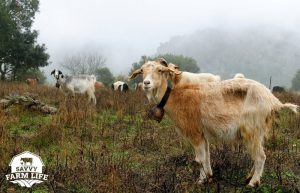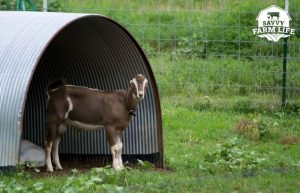
Can Goats Be Left Out in the Rain?
One of the reasons goats are such a popular choice for farm owners is that they are hardy animals. They do well in all types of weather conditions and are generally self-sufficient. However, different animals and livestock respond differently to being left out in the elements. Especially when it comes to rain or snow, some animals can suffer from hypothermia or skin conditions caused by excessive moisture.
Can goats be left out in the rain? Healthy goats are perfectly capable of being left out in the rain for long periods of time, even overnight. However, not all goats like the rain, so it’s important to provide them with adequate shelter to give them the option of escaping the rain. It’s also important to be mindful of wet conditions in cold temperatures, as this can lead any animal to becoming hypothermic.
So, are your goats healthy enough to be out in the rain? Do they have adequate dry shelter where they can find relief if they want? This article will help you to determine whether your goats are healthy enough to stay outdoors and whether you have adequate facilities for the goats if needed. Keep reading!
Leaving Goats Out in the Rain: Provide Shelter
While many goats are perfectly fine being left out in the rain to graze and go about their day, all goats need access to some type of shelter where they could escape the elements.
Goat Shelters Should Be Dry
Goats are relatively easy animals to provide shelter for. The most important thing is that the shelter provides a dry place for the goats to rest. The danger of leaving goats out in the rain is that they can become susceptible to hypothermia if the temperatures are cool. Animals are most at risk of hypothermia in cold and wet environments.
Most animals are smart enough to find shelter if they are starting to get cold or if the elements are too much to handle. Make sure the ground in the goat shelter stays dry, as the goats will lay down to rest. You can put down extra bedding to create a dry bed for your goats. The extra bedding can also help to insulate temperatures and provide extra comfort and warmth for your goats.
Make Sure Your Goat Shelter Can Protect All Your Goats
You’ll also want to make sure that your shelter is big enough to house all your goats. Goats like to stay together in a herd, so if one goes in the shelter, others will want to follow. The last thing you want is one lone goat stuck outside the shelter because there’s no room left.
Goats love to sleep in shelters that provide them with extra comfort and protection. To learn more about a goat’s sleeping pattern, visit my article How Do Goats Sleep? Goat Sleep Behavior Guide.
Leaving Goats Out in the Rain: At-Risk Goats
Though most goats are hardy enough to be left out in the rain, there are some goats that have conditions that make them more vulnerable to sickness from the cold and wet.
Baby Goats
Particularly, younger goats, (also known as kids), are much more sensitive to the rain than adult goats. The moments right after birth are when a kid is most defenseless against the cold. This is because the kids come out wet, and the cold can contribute to conditions like hypothermia.
It’s best to breed your goats in November, that way when the goats gives birth it’s in the spring when temperatures are much warmer. If you do end up with a birth in the winter months, make sure to supervise it closely and towel off your kid as soon as they come out. You can also provide a birthing stall inside your barn for winter births.
Pregnant Goats
Does that are pregnant or soon to give birth also fall into a sensitive category of goat that should not be left outside in the rain. Pregnancy in goats, similar to pregnancy in humans, is a delicate process that can leave the mother goats more susceptible to disease or infection. To avoid this, pregnant does should just be kept inside during a rainstorm.
Older Goats or Goats With Pre-Existing Conditions
Goats with pre-existing conditions, such as respiratory infections or worms, should also be kept out of the rain due to their status as a vulnerable population. If you have older goats that you want to watch out for, they are another category that should be regularly monitored. Generally speaking, if you have goats that are sick, pregnant, or unhealthy in any way, they should be kept inside in a well-ventilated shelter to protect them from the rain.
Popular Breeds of Goats for Wet and Cold Weather Climates
There are over fifty different types of goat breeds to choose from in the United States. But which breeds are best for colder, wetter climates? In order to successfully thrive in a cold climate, the goat needs to have a naturally thick coat and a healthy layer of fat.
Toggenburg Goats
The Toggenburg breed of goat is a dairy goat usually used for milk production. They typically produce between three and five quarts of milk per day during lactation periods. Beyond just their milk production, the Toggenburg is also a popular goat breed in colder climates due to their hearty nature. It hails from Sweden, where winter temperatures can drop below freezing regularly, so this goat is used to cold, wind, and snow.
Lamancha Goats
Another popular choice for farmers looking for cold-hardened goats is the La Mancha breed. La Mancha goats are dairy goats. They produce between four and six quarts of milk a day, so even more than the Toggenburg breed of goat! La Mancha goats originate from Spain, where the weather can reach freezing temperatures regularly in the winter. The La Mancha goat is an excellent choice for farmers looking for hearty goats who will be able to withstand cold climates.
Kiko Goats
Kiko goats are popular for meat production. They are a fairly new goat breed that originates from New Zealand, a country known to have a wide range of different weather patterns. Kiko goats can weigh anywhere from 120 – 200 lbs!
Depending on what you want your goats for, you may want to research the best breeds for your specific reasoning, then pick the breeds that are the most cold-hardy out of those results.
Do Goats Like the Rain?
 This is a difficult question to answer because it really depends on the individual goat. Some goats like the rain, but other goats will run at the first sign of cloudy weather. It’s important to monitor your goats in rainy weather to determine whether they are comfortable outside or not.
This is a difficult question to answer because it really depends on the individual goat. Some goats like the rain, but other goats will run at the first sign of cloudy weather. It’s important to monitor your goats in rainy weather to determine whether they are comfortable outside or not.
Goats that are uncomfortable in the rain will typically seek shelter on their own, but as a goat owner, it’s your responsibility to ensure that your goats have a safe, well-ventilated barn or refuge to seek protection from the rain.
Goats in the wild will typically seek shelter from the rain, as they do not enjoy having wet fur. Their fur can take a while to dry off after getting wet, which can contribute to them contracting infections and getting respiratory diseases. Their hair can hold moisture to their skin and cause skin irritation and fungus.
An adequate shelter is just one thing a goat will need in its pen. To learn more, visit my article What Goats Need in Their Pen: Complete List.
Can Goats Graze in the Rain?
If you’re raising free-range goats, you may be wondering if it’s alright to let them graze on grass during rainy weather. Many livestock continue to graze even if it is raining. Since a goat’s digestive system is designed to be working all day, it is perfectly fine to let your goats continue grazing if it is raining. However, you should be aware that they may be more susceptible to worms and parasites during rainy weather.
When it rains, parasites and worms travel upwards on individual stalks of grass. This is to avoid the water that pools at the base of the grass. The upper end of the grass is the part that goats like to graze on, so during rainy weather, they can contract parasites and worms from eating this wet grass. By de-worming your goats every 3-4 weeks, you should be able to keep parasites at bay.
Do Goats Get Cold?
Goats in the wild are generally self-sufficient and can withstand a multitude of temperatures. In fact, healthy goats can thrive in temperatures as low as -15°F. The reason for this is that goats have a thin layer of body fat under their fur that helps them insulate themselves from the cold.
Some goats are naturally suited to the cold, like the Kiko breed which thrives in colder climates due to their thick layer of fat. If you live in a colder environment, you may want to research goat breeds, like this one, that are content in freezing weather.
The rain can exacerbate cold temperatures by getting your goat’s fur wet, making them more susceptible to hypothermia. Though they are generally hardy animals, goats do get cold and it’s important to provide them with a warm shelter to escape the elements if they so desire.
Can You Leave Goats in the Snow?
Breeds of goats that are suited to the cold, like the Kiko breed, can withstand the snow due to their thick undercoat of fur. Instead of melting and penetrating their fur, the snow simply sits on top of the goat’s fur.
Proper nutrition is key to your goat’s survival in the winter. A nourishing diet helps your goats develop the layer of fat underneath their coat that insulates them from the fur. In order to build this fat, goats need to feed on roughage, like hay and grass. A goat’s digestive system also helps a goat to produce energy so it can stay warm. For this reason, it’s important to make sure your goat has adequate supply to forage, especially during wet or cold days.
If goats are fed only grain, they can actually starve to death as they won’t have the proper nutrients to develop a thick coat. The roughage in their diet also allows them to generate heat from the inside out, which helps to keep them warm in cold weather.
Overall, goats should be alright in the snow, as long as they have access to warm shelter and proper nutrition. Their natural insulation will keep them warm and happy in the face of cold weather.
Goats are one of the most versatile farm animals when it comes to the different environments they can live in; they’re also one of the only livestock animals that can thrive in a wooded setting. To learn more, visit my article Can Goats Live in the Woods?
